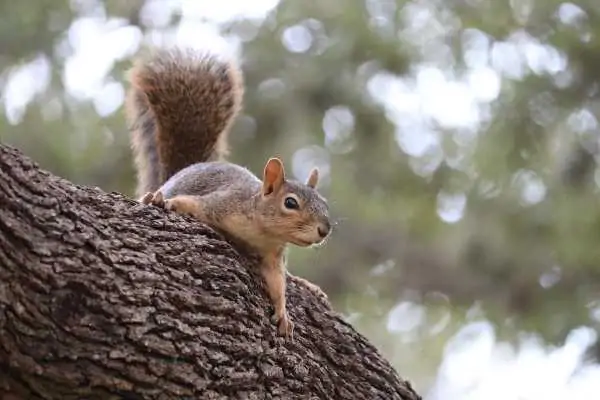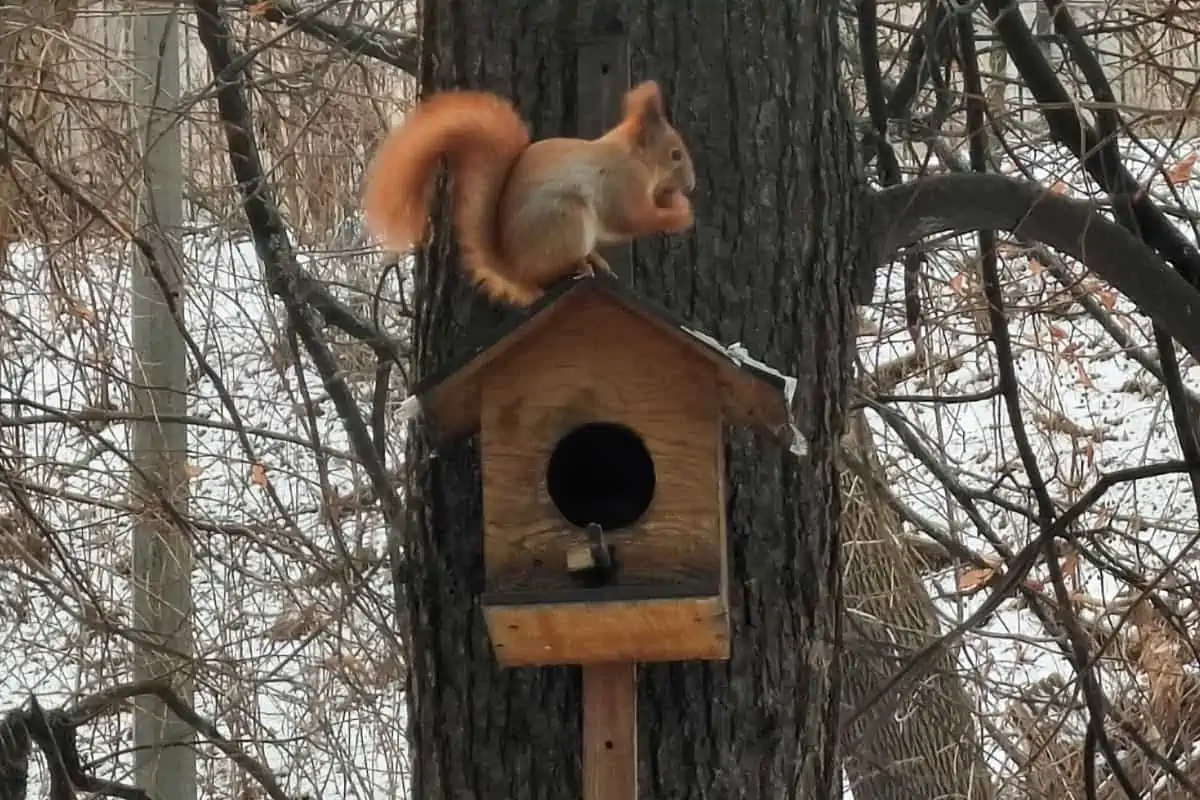Squirrels are both omnivores and opportunistic feeders who spend the majority of their time searching for food. During the summer, when these food sources are readily available, squirrels are drawn to nuts, fruits, seeds, and occasionally fungus. Little insects, mammals, reptiles, and amphibians make up a squirrel’s diet as well. People often wonder if squirrels feed on baby birds because of the range of food and the fact that they spend a lot of time in trees.
DO SQUIRRELS EAT BABY BIRDS?
Baby birds are occasionally eaten by squirrels, as you know. If a squirrel is hungry and the babies are without a parent, it may not actively seek out a bird nest to eat them, but it may attack at the chance.
Squirrels are opportunistic feeders and will eat whatever is accessible to them. Squirrels are often thought to be vegetarian because they are frequently seen eating seeds and nuts. Nonetheless, a squirrel may eat anything from insects to birds to reptiles to mammals to eggs.
Squirrels get protein, vitamins, and nutrients from baby birds in their diets. During years when other food sources are scarce, this is more likely to happen. Due to environmental circumstances, trees, for example, may not produce many acorns or pinecones in a given year.
Squirrels will have to work harder to find food, and in order to do so, they may eat baby birds, small reptiles, or insects.

TYPES OF SQUIRRELS KNOWN TO EAT BABY BIRDS
This behavior is performed by virtually any squirrel species, as well as chipmunks. Certain squirrel species, on the other hand, are more aggressive and territorial.
Baby birds are prey to the American Red Squirrel, which is territorial and aggressive. Red Squirrels are well-known for being aggressive toward their own species, not just birds.
Eastern Gray Squirrels are more calm than Red Squirrels, despite their high population across North America. If nuts and fruits are not available, adult birds, or other meal, Eastern Gray Squirrels will devour young birds.

DO SQUIRRELS EAT BIRD EGGS?
Hungry squirrels can easily get their nutrients from eggs. Squirrels can sneak into a mother bird’s nest and steal the eggs if she leaves it unattended.
The mother birds leave the nest for brief periods of time to feed, but spend the majority of their day watching over it while incubating the eggs. Squirrels typically wait for the eggs to be unattended before attacking an adult bird sitting on the nest.
Birds that share responsibility for incubation and raising nestlings have the best chance of surviving predators if both sexes are involved.
The eggs are occasionally incubated by both sexes, although most mother birds incubate the eggs alone. Male birds will sometimes allow females to go hunting for food or stay close to the nest in order to aid in defense.
Since there is usually always one parent watching the eggs or babies, these cooperative bird species, such as Downy Woodpeckers, are often successful in defending the nesting site against predators.

HOW BIRDS DEFEND NESTS FROM PREDATORS
When a squirrel is most likely to swoop in to steal eggs or babies, it is when a bird nest is left unattended by the parents.
When predators approach the nesting site, parents will defend their territory. Several bird species are dangerous, with one of them diving and pecking at squirrels that get too close.
To help conceal their nests, many birds prefer to nest in thicker foliage. Leaves and other plant materials are gathered to be put around the nest for better concealment once the nest is completed. Coloration on some bird species’ eggs helps them blend in with the nest and vegetation.
The majority of birds will flee predators that approach their nesting habitat. When it comes to their offspring, mockingbirds are renowned for being fiercely territorial and aggressive. Because they are known to “dive-bomb” pets and even people near their nest, you’ll always know when you’re close to their nest.

SQUIRREL FEEDING HABITS AND DIET
In most cases, squirrels prefer to eat nuts and fruits over baby birds and eggs. Squirrels, on the other hand, will devour newborn birds and eggs when these food sources are scarce. Seeds and corn present in bird feeders will also be devoured by squirrels. It’s likely that a squirrel is eating most of your bird seed if it’s disappearing very quickly.
Squirrels that reside in cities will also search through trash for food. If they are hungry, they have evolved into scavengers and may consume tiny dead animals.
Storage of food is also a common squirrel behavior. In the late summer and fall, squirrels will typically gather acorns and other nuts and stash them in tree holes or even bury them, which you may observe.
We say the squirrels burying the chestnuts all over the yard because one year our chestnut tree produced a huge bounty. During the winter, this allows them to ensure they have a backup food supply.

OTHER BABY BIRD PREDATORS
While protecting their nestlings, birds must worry about a variety of predators, including squirrels. Other bird species, such as Blue Jays and Crows, are opportunistic feeders that will steal other birds’ eggs and offspring.
Stealing bird eggs and devouring newborn birds are common habits among raccoons, opossums, and snakes. Because of their climbing abilities, these creatures may climb nests in tree branches as well as find nests on the ground.
After leaving the nest, baby birds are helpless and face a series of difficulties. Since they are wandering on the ground before learning to fly, fledglings are often the most vulnerable. Bird parents usually stay nearby and keep an eye on their offspring, but they aren’t always successful at frightening a predator.
CONCLUSION
Before they reach full fledged adulthood, egg-laying birds and their younglings face numerous obstacles. The squirrels may pose a danger to birds, even if they are not often seen in your yard with them.
While picking for plant-based foods is much simpler than capturing a baby bird, most squirrels only do it when food is short or they are missing something essential in their diet.
